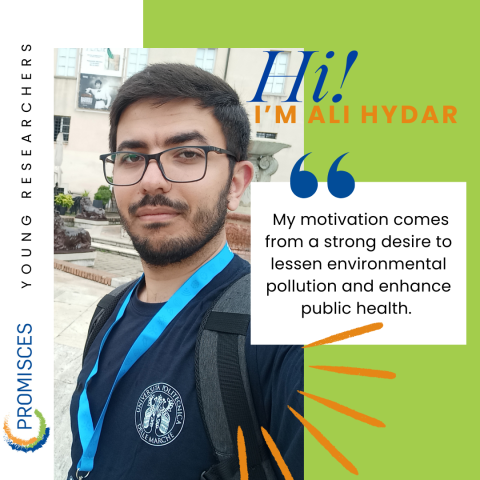PROMISCES Young Researchers: Ali Hydar
In PROMISCES, many young researchers are working in a wide variety of fields. But one thing they have in common: To enable a circular economy in the soil-sediment-water system and to fight PFAS. One of them is Ali Hydar who is working as a research fellow in the WWEELab Research Gruop at Università Politecnica delle Marche. His motivation for working in this sector comes from a strong desire to lessen environmental pollution and enhance public health.
Do you think your work can have an impact on the world? What is your motivation?
Yes, I strongly believe that my work has the potential to have a significant global influence. My motivation comes from a strong desire to lessen environmental pollution and enhance public health. In this regard, one of the most exciting aspects of my work is likely the potential to help further the understanding of persistent environmental pollutants, such as PFAS. In addition to advancing research, this could result in cleaner air, water, and soils and an overall higher standard of living for communities worldwide through the policies that can be learned from it.
Why did you choose to work in the field of PFAS research and why is this topic so important?
I have chosen to work in the PFAS area due to the high demand for mitigating massive contamination and persistence of those chemicals in the environment. PFAS are commonly referred to as "forever chemicals" since they are poorly biodegradable and able to accumulate inside living organisms, thus leading to a number of adverse health effects. Such a topic at the intersection of public health, environmental sustainability, and regulatory science is very important. Research on PFAS behavior, sources, and remediation techniques leads to the development of protection strategies that will work effectively for the protection of ecosystems and human health.
Which impact do you think your research will have on the future? What changes can be made with this new knowledge?
Such findings may greatly contribute to the enforcement of new regulations and guidelines mainly in the EU. Robust scientific data that we can provide on PFAS in terms of their occurrence, behavior, and effects may be used to argue a tighter limit and more comprehensive policies. Such new knowledge may then result in improved risk assessments, better management practices, and innovative remediation technologies. Ultimately, it could drive legislative changes in order to reduce PFAS exposure and contamination for a better, healthier environment through the assurance of public health safeguards.

Ali Hydar, research fellow in the WWEELab Research Gruop at Università Politecnica delle Marche. @Ali Hydar
Does working in PROMISCES have an impact on your everyday life?
But certainly, working on the PROMISCES project had created a sort of alertness in me about PFAS in life and everything. I had become more vigilant with respect to the choice of products free from PFAS and advocating newer safer alternatives. And that awareness has been extended to the personal environment—a fact borne out by long discussions of PFAS ubiquitousness in the environment and consumption items with friends and family. They are increasingly conscious of their choices and the potential impact on health and the environment, and a very rewarding result of my work is the rise in self-directed practice, informed by my research dissemination efforts.
